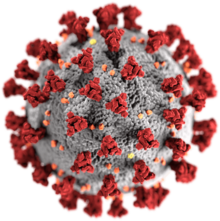Impact of the COVID-19 pandemic on other health issues
The COVID-19 pandemic has had many impacts on global health beyond those caused by the [[Coronavirus disease 2019|COVID-19 disease]] itself. It has led to a reduction in hospital visits for other reasons. There have been 38 per cent fewer hospital visits for heart attack symptoms in the United States and 40 per cent fewer in Spain.[1] The head of cardiology at the University of Arizona said, "My worry is some of these people are dying at home because they're too scared to go to the hospital."[2] There is also concern that people with strokes and appendicitis are not seeking timely treatment.[2] Shortages of medical supplies have impacted people with various conditions.[3]
| Part of a series on the |
| COVID-19 pandemic |
|---|
 |
|
|
|
International response |
|
Medical response |
|
|
|
In several countries there has been a marked reduction of spread of sexually transmitted infections, including HIV, attributable to COVID-19 quarantines, social distancing measures, and recommendations to not engage in casual sex.[4][5] Similarly, in some places, rates of transmission of influenza and other respiratory viruses significantly decreased during the pandemic.[6][7][8] The pandemic has also negatively impacted mental health globally.[9]
Mental health
Recommendations
UNFPA recommends that governments maintain sexual and reproductive health and rights (SRHR) information and services, protect health workers and limit spread of COVID-19. This includes a comprehensive approach to SRHR information and services encompassing antenatal care (ANC), care during childbirth, postnatal care (PNC), contraception, safe abortion care, prevention, testing and treatment of HIV, where relevant, as well as sexually transmitted infections (STI), detection and treatment of GBV, and sexual health services and information.[13]
See also
References
- Garcia S, Albaghdadi MS, Meraj PM, Schmidt C, Garberich R, Jaffer FA, et al. (April 2020). "Reduction in ST-Segment Elevation Cardiac Catheterization Laboratory Activations in the United States during COVID-19 Pandemic". Journal of the American College of Cardiology. doi:10.1016/j.jacc.2020.04.011. PMC 7151384. PMID 32283124.
- 'Where are all our patients?': Covid phobia is keeping people with serious heart symptoms away from ERs, Stat News, Usha Lee McFarling, 23 April 2020.
- Faust, Jeremy Samuel (April 28, 2020). "Medication Shortages Are the Next Crisis". The Atlantic. Retrieved May 17, 2020.
- "Sexually transmitted infections surveillance reports - Reports". www.health.nsw.gov.au. Retrieved May 9, 2020.
- Wareham, Jamie. "U.K. Lockdown Has 'Broken HIV Chain' With Huge Reduction In New STI Cases". Forbes. Retrieved May 9, 2020.
- Cowling, Benjamin J.; Ali, Sheikh Taslim; Ng, Tiffany W. Y.; Tsang, Tim K.; Li, Julian C. M.; Fong, Min Whui; Liao, Qiuyan; Kwan, Mike YW; Lee, So Lun; Chiu, Susan S.; Wu, Joseph T. (May 1, 2020). "Impact assessment of non-pharmaceutical interventions against coronavirus disease 2019 and influenza in Hong Kong: an observational study". The Lancet Public Health. 5 (5): e279–e288. doi:10.1016/S2468-2667(20)30090-6. ISSN 2468-2667. PMC 7164922. PMID 32311320.
- Klein, Alice. "Australia sees huge decrease in flu cases due to coronavirus measures". New Scientist. Retrieved May 9, 2020.
- "Weekly U.S. Influenza Surveillance Report (FluView)". U.S. Centers for Disease Control and Prevention (CDC). May 8, 2020. Retrieved May 9, 2020.
- Brooks, Samantha K.; Webster, Rebecca K.; Smith, Louise E.; Woodland, Lisa; Wessely, Simon; Greenberg, Neil; Rubin, Gideon James (March 14, 2020). "The psychological impact of quarantine and how to reduce it: rapid review of the evidence". The Lancet. 395 (10227): 912–920. doi:10.1016/S0140-6736(20)30460-8. ISSN 0140-6736. PMC 7158942. PMID 32112714. Archived from the original on March 13, 2020. Retrieved March 20, 2020.
- CDC (February 11, 2020). "Coronavirus Disease 2019 (COVID-19)". Centers for Disease Control and Prevention. Retrieved May 17, 2020.
- "Inter-Agency Standing Committee Guidelines on Mental Health and Psychosocial support" (PDF). MH Innovation. Archived (PDF) from the original on March 31, 2020. Retrieved March 28, 2020.
- "OECD". read.oecd-ilibrary.org. Retrieved May 7, 2020.
- Continuing essential Sexual, Reproductive, Maternal, Neonatal, Child and Adolescent Health services during COVID-19 pandemic (PDF). World Health Organization, UNFPA, UNICEF. 2020.